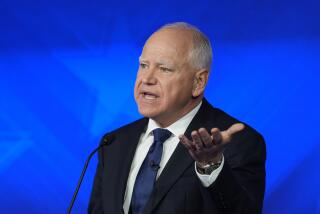Hong Kong student leader Joshua Wong acquitted in protest against Beijing
- Share via
Reporting from Hong Kong — Joshua Wong, the face of the 2014 pro-democracy demonstrations in Hong Kong, was acquitted Tuesday of two counts of obstructing a police officer during an earlier protest against mainland China’s claim of “complete jurisdiction” over the semiautonomous Chinese territory.
While the protest was unrelated to what came to be known as the Umbrella Movement, his prosecution has been seen by many in Hong Kong as a heavy-handed response by authorities in Beijing to the territory’s growing restlessness.
“The judge made a fair decision,” Wong said outside the courthouse, donning the turquoise T-shirt of his political party stenciled with the motto: “Determine Our Future.” “We’ll still keep on fighting for Hong Kong’s core values.”
“Shame on political prosecution,” chanted a crowd of about 50 supporters. “Carry on civil disobedience without fear.”
In addition to Wong, fellow student leader Nathan Law; Albert Chan, a legislator from the so-called pan-democratic camp; and Raphael Wong, a leader of the League of Social Democrats party, all were acquitted.
In three weeks, however, Law and Joshua Wong are to receive verdicts on charges stemming from their involvement in the Umbrella Movement.
“That’s a more challenging trial,” said Wong.
In June 2014, Wong and some 20 other demonstrators torched an outsized replica of a controversial document issued by Chinese Communist authorities. The document asserted Beijing’s “complete jurisdiction” over Hong Kong, a former British colony that returned to Chinese rule in 1997 under an arrangement known as “one country, two systems.”
Wong was seen blocking a police officer who rushed to put out the flames with bottled water. Video captured a confrontation that ensued after Wong snatched an empty bottle from one of the police officers and other demonstrators came to Wong’s defense. The charges of obstruction stemmed from that incident.
The territory of 7.3 million has been allowed to preserve a wide range of civil liberties, its British common law system and “a high degree of autonomy” for 50 years under a mini-constitution known as the Basic Law. Because of those constitutional protections, Hong Kong has maintained a lively, freewheeling protest culture during its 19 years under Chinese sovereignty.
Last week, however, a social worker was sentenced to 12 weeks in jail for assaulting police officers during the Umbrella Movement by dousing them with what appeared to be bottled water. Seven officers are now on trial for kicking and punching him.
A conviction Tuesday would have fanned more anger against what has been seen as Beijing’s meddling in the territory’s affairs and could have turned the student leaders into political martyrs. Many Hong Kongers regard the Liaison Office, the target of the protest, as the mainland’s command center for exerting influence in local affairs. The office has seen numerous protests, most recently on Sunday, after a candlelight vigil for victims of the 1989 Tiananmen Square massacre.
And in April, Wong formed a new political party to field candidates for the Legislative Council elections this fall. At 19, Wong is two years too young to run for office, but any conviction would bar him from running even after he turns 21. And a sentence of any length may deal a blow to the fledgling party.
Law is a special correspondent.
ALSO
Journalists mourn NPR photographers killed in Afghanistan
What it’s like to live in the world’s fastest growing major economy
Lancome draws outrage in Hong Kong after dropping pro-democracy pop singer
More to Read
Sign up for Essential California
The most important California stories and recommendations in your inbox every morning.
You may occasionally receive promotional content from the Los Angeles Times.










